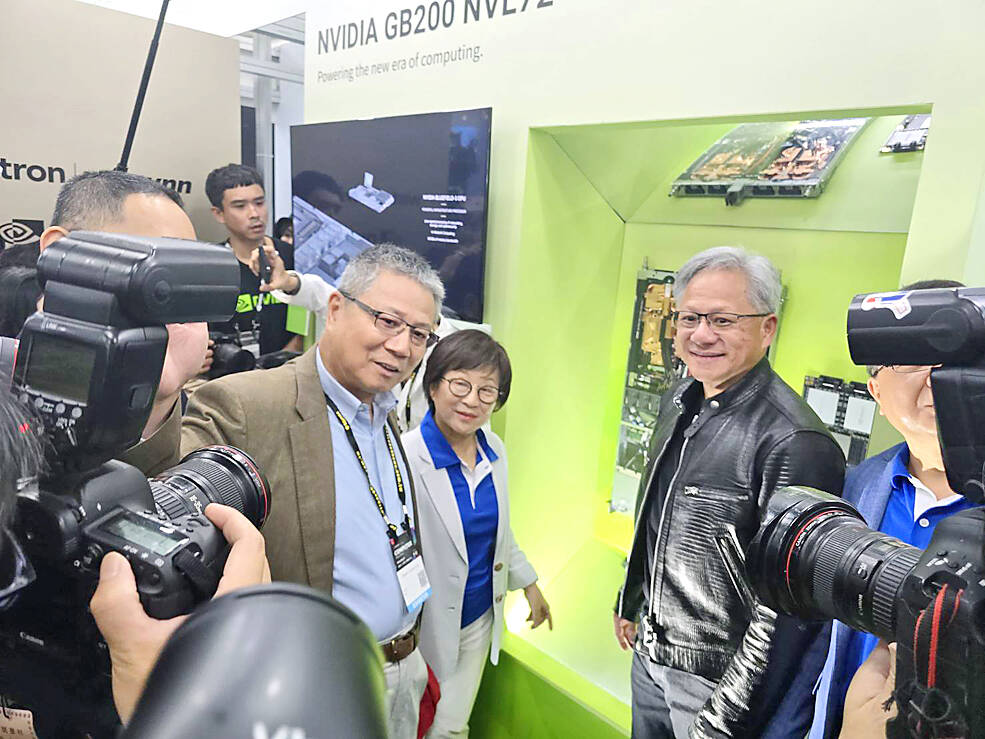Wiwynn Corp (緯穎), a supplier of artificial intelligence (AI) servers and components, on Thursday said that it plans to invest US$300 million to build its first manufacturing facility in Texas to cope with the realignment of global supply chains amid escalating macroeconomic uncertainty.
Wiwynn operates manufacturing facilities in Taiwan, Mexico and Malaysia. The Texas factory plan came as US President Donald Trump said that sweeping tariffs of 25 percent on Mexican and Canadian imports would take effect on March 4.
Domestically, Wiwynn is also increasing its capacity. The company on Thursday raised capital expenditures by about 29 percent for its new manufacturing facility and office building at the Southern Science Park to NT$8 billion (US$243.8 million), higher than an earlier estimate of NT$6.2 billion.

Photo: CNA
The new investment would further strengthen the company’s global production footprint and expand its scope of delivery, the company said.
Wiwynn counts US cloud services providers Meta Platforms Inc and Microsoft Corp among its major clients.
“The company is optimistic about data center long-term market demand and growth, and is committed to continuous investments to deepen AI, computing, thermal, and technologies and product development,” Wiwynn said. “The company will also flexibly adjust the global capacity allocation to respond to political and economic dynamics, and customer demand.”
Wiwynn on Thursday posted the strongest quarterly net profit in the company’s history last quarter, amounting NT$7.05 billion, benefiting from strong demand for regular and AI-enabled servers.
That means last quarter’s net profits had doubled from NT$3.51 billion in the fourth quarter of 2023. Earnings per share soared from NT$20.1 a year ago to NT$37.9 last quarter.
The company previously told investors that AI servers accounted for about half of its total revenue in the final quarter of last year, compared with about 20 percent in the first quarter. Revenue last quarter surged 97.5 percent year-on-year to NT$115.61 billion.
Last year as a whole, Wiwynn’s net profits surged 89 percent year-on-year to NT$22.78 billion compared with NT$12.04 billion in 2023. EPS climbed from NT$68.88 to NT$126.57.
Gross margin improved from 9.37 percent in 2023 to 10.37 percent last year, while revenue hit a record high after rising 49 percent from NT$241.90 billion to NT$360.54 billion last year.
The company’s board of directors on Thursday approved a cash dividend distribution of NT$74 per common share, setting an all-time high. That represented a payout ratio of 58.47 percent.

Taiwan will prioritize the development of silicon photonics by taking advantage of its strength in the semiconductor industry to build another shield to protect the local economy, National Development Council (NDC) Minister Paul Liu (劉鏡清) said yesterday. Speaking at a meeting of the legislature’s Economics Committee, Liu said Taiwan already has the artificial intelligence (AI) industry as a shield, after the semiconductor industry, to safeguard the country, and is looking at new unique fields to build more economic shields. While Taiwan will further strengthen its existing shields, over the longer term, the country is determined to focus on such potential segments as

UNCERTAINTY: Innolux activated a stringent supply chain management mechanism, as it did during the COVID-19 pandemic, to ensure optimal inventory levels for customers Flat-panel display makers AUO Corp (友達) and Innolux Corp (群創) yesterday said that about 12 to 20 percent of their display business is at risk of potential US tariffs and that they would relocate production or shipment destinations to mitigate the levies’ effects. US tariffs would have a direct impact of US$200 million on AUO’s revenue, company chairman Paul Peng (彭雙浪) told reporters on the sidelines of the Touch Taiwan trade show in Taipei yesterday. That would make up about 12 percent of the company’s overall revenue. To cope with the tariff uncertainty, AUO plans to allocate its production to manufacturing facilities in

Chizuko Kimura has become the first female sushi chef in the world to win a Michelin star, fulfilling a promise she made to her dying husband to continue his legacy. The 54-year-old Japanese chef regained the Michelin star her late husband, Shunei Kimura, won three years ago for their Sushi Shunei restaurant in Paris. For Shunei Kimura, the star was a dream come true. However, the joy was short-lived. He died from cancer just three months later in June 2022. He was 65. The following year, the restaurant in the heart of Montmartre lost its star rating. Chizuko Kimura insisted that the new star is still down

While China’s leaders use their economic and political might to fight US President Donald Trump’s trade war “to the end,” its army of social media soldiers are embarking on a more humorous campaign online. Trump’s tariff blitz has seen Washington and Beijing impose eye-watering duties on imports from the other, fanning a standoff between the economic superpowers that has sparked global recession fears and sent markets into a tailspin. Trump says his policy is a response to years of being “ripped off” by other countries and aims to bring manufacturing to the US, forcing companies to employ US workers. However, China’s online warriors